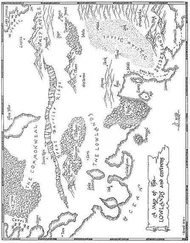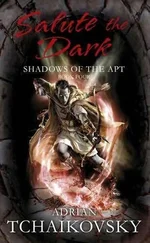Adrian Tchaikovsky - Heirs of the Blade
Здесь есть возможность читать онлайн «Adrian Tchaikovsky - Heirs of the Blade» весь текст электронной книги совершенно бесплатно (целиком полную версию без сокращений). В некоторых случаях можно слушать аудио, скачать через торрент в формате fb2 и присутствует краткое содержание. Жанр: Фэнтези, на английском языке. Описание произведения, (предисловие) а так же отзывы посетителей доступны на портале библиотеки ЛибКат.
- Название:Heirs of the Blade
- Автор:
- Жанр:
- Год:неизвестен
- ISBN:нет данных
- Рейтинг книги:4 / 5. Голосов: 1
-
Избранное:Добавить в избранное
- Отзывы:
-
Ваша оценка:
- 80
- 1
- 2
- 3
- 4
- 5
Heirs of the Blade: краткое содержание, описание и аннотация
Предлагаем к чтению аннотацию, описание, краткое содержание или предисловие (зависит от того, что написал сам автор книги «Heirs of the Blade»). Если вы не нашли необходимую информацию о книге — напишите в комментариях, мы постараемся отыскать её.
Heirs of the Blade — читать онлайн бесплатно полную книгу (весь текст) целиком
Ниже представлен текст книги, разбитый по страницам. Система сохранения места последней прочитанной страницы, позволяет с удобством читать онлайн бесплатно книгу «Heirs of the Blade», без необходимости каждый раз заново искать на чём Вы остановились. Поставьте закладку, и сможете в любой момент перейти на страницу, на которой закончили чтение.
Интервал:
Закладка:
There were professionals, former Consortium clerks or retired Slave-Corps officers, whose sole business was to find prisoners a fitting place of durance – either until their eventual fate was decided or enacted, or because that imprisonment represented that fate. Cells, mines, shackles, the quick mercy of the blood-fights – or as one of a small but mysterious number who were sent to the palace and simply… disappeared.
Many prisoners laboured, too. Often this was not even as a result of a sentence, just a good use of resources that would otherwise be sitting idle while being fed for free. There were the parched-dry quarries of Shalk, the winding mines of the Delves, logging camps, fields, masons’ yards, each penitent fitted to his interim fate with a master’s expertise as delicate as that of a matchmaker.
Then there were the factories, which were always hungry but seldom fed with the bodies of prisoners. Most of the workers were slaves or citizens, and all of them were not just Apt, but artificers of some mean grade or other. The vast machine-noisy halls were operated day and night, and if it was possible they were run even while errant machines were being fixed. Fingers and toes were a cheap currency in those chattering, clattering rooms, but it was better work than the mines, less dangerous than the army. The free workers there held themselves to be a curious aristocracy, standing together against the bureaucrats, the taskmasters, and the grafters of the Empire. They might only be churning out standard-issue breeches by the hundred, but where, as they pointed out, would an army be without its trousers?
Sometimes an artificer fell from grace, and then the factories were always waiting. Even murderers, even traitors, if they had a spark of mechanical skill, would be chained to the machines and put to work while waiting for sentence. A little knowledge was too precious to waste.
Angved hated it. It was fair to say that he was being unreasonable, given all the other ways a prisoner could be spending his time, but even so… He had been a lieutenant in the Engineering Corps – an officer! – and now a burly slaver came each morning to chain him up in front of all these others, as even the slaves were not chained, and he worked at the most menial, repetitive tasks, and risked his hide between the teeth of the looms if they jammed, and he had to bear the mockery of the rest of the workforce, because he had been better than them, and had failed.
He had never been a high-flier. Past forty now, his hair greying, and when he was young he had thought he would be a major by this age, perhaps with some comfortable teaching post. Then there had been a string of poor decisions, the wrong horses backed, unavoidable failures that had drawn the ire of his superiors. He had never made captain, whilst the declining quality of his assignments had eventually ensured that he never would. Then had come the bastard Rekef with their make-or-break plan for Khanaphes, and he had seen it as a desperate chance to regain his place on the ladder, for all that it would probably have ended with a knife in his back had all gone according to plan.
All had most definitely not gone according to plan.
With the exception of two old women who ran the kitchen, the other factory hands were not Wasps. They had a curious two-tier organization, two separate tribes side by side yet passing through one another as though existing in fractionally shifted worlds. The Beetle-kinden, and the bulk of the slaves – Ants, Bees, even some halfbreeds who were inexplicably not despised by their comrades as Angved would have anticipated – worked at one level of detail, whilst a host of Fly-kinden men and women were busy in amongst them, passing under and over and sometimes even through the machines, trusting to their small size, delicate fingers and quick reflexes to preserve them from injury. The only fifth wheel in the factory was Angved himself, the size of a normal kinden – by his standards – and yet put to the most menial jobs during both shifts, by specific decree.
For a man formerly of the Engineers, it was pure gall, insulting, demoralizing, as good as receiving a beating any day. It showed that the clerks who had assigned him here knew their business.
He had made his pleas. He had shown them his findings. Still, they had been dead set on his excruciation and then a public execution, on general principle. Then it had all been dropped. There had been one night when he was dragged before a triumvirate of hooded men – Rekef for sure – and they talked amongst themselves about him, and he understood that the Khanaphes expedition was now an embarrassment best removed from history entirely, and him along with it.
But he had lived on for another night, in fear, and then another, and then a quiet, lean man had come and explained to him how he had best forget the name of that desert city, unless someone should mention it to him first.
A tenday later, and the factory had got him. Since then he had been here, the butt of every joke, hearing the snickering of slaves, the laughter of women – Fly-kinden women no less – wasting his training in the manufacturing of the banal and the commonplace. Only one thought kept him sane, for, while he would not converse with his fellows there, he overheard their copious gossip. As he eked his days out amongst the menials of the machine world, one fact went round and round in his head.
They’ve gone to Khanaphes.
The Empire had taken Khanaphes as easily as he had known it must, having seen the city’s primitive defences first hand. But why would the Empress stretch her reach so far, and for so little gain, unless. ..
After he had returned from there, he had cast his die. He had given his report, his numbers, the results of his tests. He had supposed them since burned, lost, misfiled, sitting in an unread stack of trivia on some uneducated Rekef thug’s desk. But what if an artificer had got hold of them, after all? What if something Angved had said had penetrated as far as the Engineering Corps?
They’ve gone to Khanaphes.
Of all the world, he had no wish to return to that cursed city, but nowhere else would rescue him from this humiliating penance, and he still had enough frustrated ambition to overcome his fears and his memories.
They’ve gone to Khanaphes.
It became his mantra, his hope. And one day, after tendays and tendays of wretched picking at the factory machines, they came for him as well.
They came halfway through the working day: serious, solid men in uniform, who muscled into the factory without a word and struck his chains off in a manner that made it clear that being shackled to an automated loom would be luxury compared to where he was going next. The rest of the workforce had gone quiet and diligent immediately, their chatter and gossip killed in an instant.
When they hauled him out of that place, he had assumed it would be to the interrogation table for sure, since their grim manner suggested nothing else. They always claimed that doctors and artificers broke first, for every junior machine-hand ended up running the tables for the Rekef questioners once or twice, and, after that, little imagination was needed to proceed through all the ways a body could be broken beyond any engineer’s repair.
They hustled him across the city until he recognized the district. It was a home away from home for him, the workshops and familiar halls of the Engineering Corps in the little quarter of the city they had made their own. It did not look so welcoming now, for nobody met his eyes. Nobody would admit to knowing this old washed-out former lieutenant who had somehow managed to bring so much wrath down upon his own shoulders.
A moment later and he was inside the Severn Hill, a squat ziggurat named after the Corps’ first colonel. Rather than the well-lit debating rooms and the grand hall, however, he was hauled downstairs, away from the sun, into the tunnels beneath.
Читать дальшеИнтервал:
Закладка:
Похожие книги на «Heirs of the Blade»
Представляем Вашему вниманию похожие книги на «Heirs of the Blade» списком для выбора. Мы отобрали схожую по названию и смыслу литературу в надежде предоставить читателям больше вариантов отыскать новые, интересные, ещё непрочитанные произведения.
Обсуждение, отзывы о книге «Heirs of the Blade» и просто собственные мнения читателей. Оставьте ваши комментарии, напишите, что Вы думаете о произведении, его смысле или главных героях. Укажите что конкретно понравилось, а что нет, и почему Вы так считаете.












